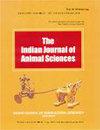公犬针孔和节段结扎释放去势技术的比较评价
IF 0.3
4区 农林科学
Q4 AGRICULTURE, DAIRY & ANIMAL SCIENCE
引用次数: 0
摘要
本研究进行了比较两种微创手术原位阉割技术在狗。将12只公犬随机分为两组,每组6只。第一组采用针孔(PH)阉割,第二组采用结扎释放(SLR)阉割。分别于第0天、第3天、第14天、第28天记录生理参数、睾丸尺寸、血液生化、超声检查及疼痛评分。第0、28天分别取睾丸组织活检标本进行组织病理学检查。生理参数、睾丸宽度和高度差异不显著,而睾丸周长和体积差异显著。血红蛋白、堆积细胞体积、总白细胞计数和差异白细胞计数在组内和组间无显著差异。皮质醇和MDA在第3天显著升高,而GSH在第3天与其他时间间隔相比显著降低。两组的疼痛评分在第3天均显著增高,而II组的疼痛评分也显著增高。两种技术的睾丸激素水平都明显降低,但与第一组相比,第二组的睾丸激素水平明显更低。超声检查和组织病理学检查显示,两种技术的睾丸都有明显的变性。结论:与结扎松脱技术相比,针孔阉割技术具有微创、省时、经济、术后并发症少等优点。本文章由计算机程序翻译,如有差异,请以英文原文为准。
Comparative evaluation of pinhole and section ligation release castration techniques in male dogs
The present study was carried out to compare two minimally invasive surgical in situ castration techniques in dogs. Male dogs (n-12) brought to the department for elective castration were randomly divided into two groups comprising six in each group. In Group I, pinhole (PH) castration, and section ligation release (SLR) castration in group II were performed. Physiological parameters, testicular dimensions, haemato-biochemical analysis, ultrasonographic examination and pain scores were recorded on 0th, 3rd, 14th and 28th day. Testicular tissue biopsy sample for histopathological examination were taken on 0th and 28th day. Physiological parameters, testicular breadth and height revealed non-significant variation, while significant difference was observed in testicular circumference and volume in both the groups. Non-significant difference was noted in haemoglobin, packed cell volume, total leucocyte count and differential leucocyte count within or in between the groups. Cortisol and MDA were significantly higher on 3rd day, whereas GSH was significantly lower on 3rd day in comparison to other time intervals in both the groups. Pain scores were significantly higher on 3rd day in both the groups and were also significantly more in group II. Testosterone levels were markedly reduced in both the techniques, but values were significantly lesser in group II as compared to group I. Ultrasonographic and histopathological examination revealed marked testicular degeneration in both the techniques. It was concluded that pinhole castration technique is minimally invasive, less time consuming, economical and has less post-operative complications in comparison to section ligation and release technique.
求助全文
通过发布文献求助,成功后即可免费获取论文全文。
去求助
来源期刊

Indian Journal of Animal Sciences
农林科学-奶制品与动物科学
CiteScore
0.60
自引率
25.00%
发文量
220
审稿时长
8 months
期刊介绍:
Articles published in The Indian Journal of Animal Sciences encompass a broad range of research topics in animal health and production related to cattle, buffalo, sheep, goat, camel, equines, pig, rabbit, yak, mithun, poultry and fisheries. Studies involving wildlife species and laboratory animal species that address fundamental questions about their biology will also be considered for publication. All manuscripts must present some new development and must be original, timely, significant and scientifically excellent. Papers will be rejected if standards of care of, or procedures performed on animals are not up to those expected of humane veterinary scientists. At a minimum, standards must meet the International Guiding Principles for Biomedical Research involving Animals, as issued by the Council for International Organizations of Medical Sciences. (C.I.O.M.S., c/o WHO, CH 1211 Geneva 27, Switzerland). Articles reporting new animal disease must follow GOI directive as given in detail in Guidelines to Authors.
 求助内容:
求助内容: 应助结果提醒方式:
应助结果提醒方式:


